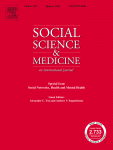
Marriage, Widowhood, and Health Care Use
Abstract
Despite suggestive evidence, there has been no adequately powered systematic study of the ways in which marital status influences health care consumption. Using a novel data set of 609,016 newly diagnosed, seriously ill elderly individuals in the USA, and employing hierarchical linear models, we look at differences in the experience of hospitalization as a function of marital status. We find that the married consistently use higher quality hospitals and have shorter lengths of stay. On the other hand, the married and the widowed appear to receive similar quality care once they are in the hospital. Marital status thus has a substantial impact on the health care obtained by the elderly. We suggest that these patterns are most consistent with spouses exerting their benefits by functioning as higher-order decision-makers than as home health assistants.
Citation:
T.J. Iwashyna and N.A. Christakis, "Marriage, Widowhood, and Health Care Use" Social Science and Medicine, 57(11): 2137-2147 (December 2003)